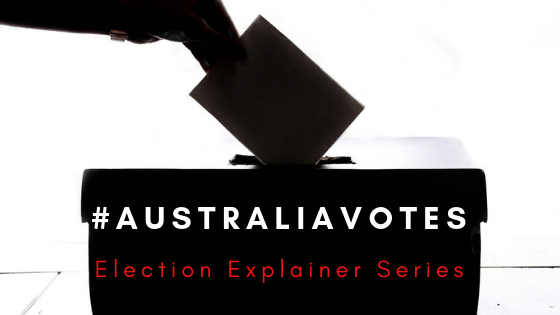With Australia heading to the polls this week, there isn’t a whole lot of time to decide who to vote for.
Most people are aware of the two major parties, Labor (ALP) and the Liberal and National Coalition (LNP), but don’t know much about the others. Here at upstart we have made it easy for you, providing a bit of background to some of the minor parties that will contest Victorian seats in the Federal parliament next month.
The Greens
According to their website, The Australian Greens Party or “The Greens” are a political party based around four key principles: ecological sustainability, grassroots democracy, social justice and peace and non-violence. They focus on left-wing solutions to problems such as the increasing cost of living, environmental destruction and climate change.
The Greens’ origins can be traced back to several Australian states including Western Australia and Tasmania. The national Greens party was formed in 1992.
Some of the Greens’ main policies are:
- Reducing carbon emissions.
- Better treatment of refugees.
- Cheaper education.
Greens leader Senator Richard Di Natale outlined his party’s major policy positions for the upcoming election campaign in an 11 April media release posted on the party website.
“This is the climate change election,” he said.
“Over the next 37 days, we’ll be outlining our comprehensive plan to turn Australia into a renewable energy superpower, move to 100 percent renewables by 2030 and create more than 180,000 jobs across the economy in the process.”
Currently the Greens have nine federal senators and one federal MP in Adam Bandt, the current Member for Melbourne. Their leader, Richard Di Natale is a Senator for Victoria.
Pauline Hanson’s One Nation
Founded by Pauline Hanson in 1997, One Nation, according to its website, was established at a time when “political correctness reigned supreme”. The party is right-wing, populist, protectionist and nationalist in its views and has a strong focus on protecting “Australian values”.
Some of the issues that Hanson and One Nation advocate against are:
- The embrace of multiculturalism.
- The demise of youth employment opportunities.
- Full foreign ownership of Australian land and assets.
- What they view as unsustainable immigration numbers.
In a One Nation press release on 12 April, Senator Hanson outlined her proposed solution to the drought crisis.
“This country has been crying out for a solution to drought and I have given my commitment to the people of Australia that if One Nation continues to hold the balance of power after this election, we will build the hybrid Bradfield Water Scheme and drought-proof much of the country, while solving the issue of water for the Murray-Darling,” she said.
Currently, One Nation has three representatives in the Federal Parliament: QLD Senator Pauline Hanson, WA Senator Peter Georgiou and Member for Mirani Stephen Andrew in Queensland.
United Australia Party
The United Australia Party (UAP) was founded by mining magnate Clive Palmer in 2013, as the Palmer United Party. The party’s slogan is “Make Australia Great”.
The UAP is considered right-wing and its website says it stands for:
- A strong position on political lobbyists. The UAP believes party officials should not be lobbyists.
- Revising Australia’s refugee policy to ensure borders are protected and refugees are given opportunities for a better and future lifestyle.
- Creating mineral wealth to contribute to the Australian community.
- A system where regions who contribute wealth earn a substantial amount of that wealth back.
In a recent media release addressing the 2019 Federal Budget, Palmer detailed the ways he believes UAP policies would improve the economy.
“Structural changes such as abolishing provisional tax would put $70 billion back into the economy instantly,” he said.
“We need to introduce a zonal taxation system giving regional Australians a 20% tax break, which will encourage people to move to regional areas and reduce infrastructure pressure in our cities.”
Currently the UAP’s only member of Federal Parliament is Brian Burston, a senator for NSW. They plan to field candidates for all 151 electorates in the coming election.
Derryn Hinch’s Justice Party
Derryn Hinch’s Justice Party was started by media personality and Senator Derryn Hinch in 2015.
The party believes that the Australian justice system isn’t treating the victims of crime fairly.
“In Australia, in recent years, it has seemed that magistrates and judges are, increasingly, dangerously, more concerned with the welfare of convicted criminals than they are about their victims,” the website states.
“We believe the punishment should fit the crime.”
Some of DHJP’s current policies, listed on their site include:
- Justice in sentencing so it reflects community views.
- Bail reform so criminals won’t re-offend on bail.
- A public register of convicted sex offenders.
- Legalising euthanasia.
As a Senator for Victoria, Derryn Hinch is the only DHJP member in Federal Parliament.
The Animal Justice Party
The Animal Justice Party is a left-wing political party founded in 2009, in response to what they see as growing public concern about the neglect of animals and animal protection issues by political parties.
The charter on their website states a clear purpose for the party.
“It will give a voice to those who cannot speak for themselves,” the website states.
The AJP hopes to bring an end to practices such as greyhound racing and live animal exports.
Stances on current issues:
- Euthanasia – AJP supports voluntary euthanasia with the appropriate safeguards in place.
- Asylum seekers – AJP believes that Australia should honour the treaties that it has ratified.
The Animal Justice Party does not currently have any members in Federal Parliament, but has numerous candidates from Victoria in this election.
Other minor parties that will contest Australian seats on 18 May include the Christian Democrats, Liberal Democrats, Democratic Labour Party, Shooters, Fishers and Farmers Party and the Centre Alliance Party.
Matthew Hughes is a third year Bachelor of Media and Communications (Sports Journalism) student at La Trobe University. You can follow him on Twitter @matthughes114.
Image from pexels.com.







